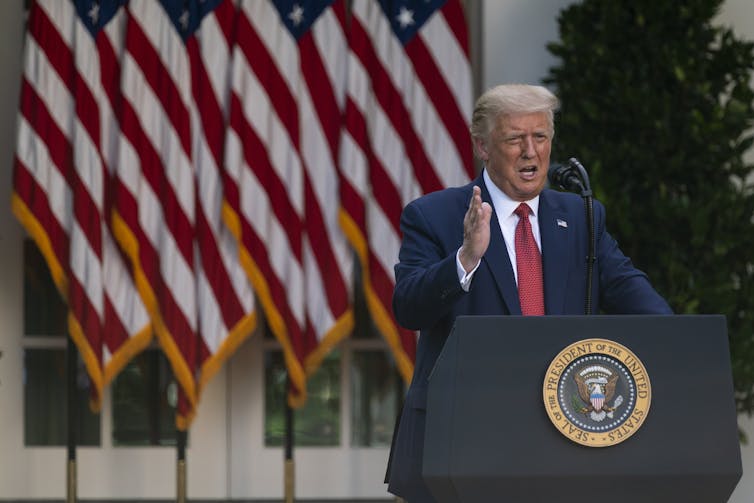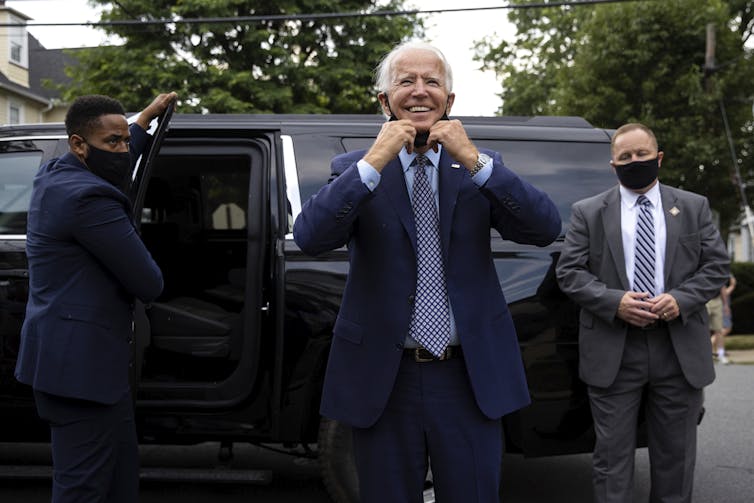As the US election looms, Trump is running as hard against China as he is against Biden
- Written by Tony Walker, Adjunct Professor, School of Communications, La Trobe University
In the Rose Garden of the White House earlier month the world witnessed a signal moment: a foreign power was catapulted into an American presidential election campaign in a way not witnessed in generations.
“Joe Biden and President Obama freely allowed China to pillage our factories, plunder our communities and steal our secrets,” US President Donald Trump told reporters.
Actually, this was less a press event than an opportunity for Trump to vent his frustrations over the damage a virus that originated in China had inflicted on his re-election prospects. This is a contagion the president refers to as the “kung flu”.
One of the consequences of a spreading virus and spiralling death rates is the Trump campaign is deprived of its favoured campaigning vehicle: mass rallies in which the president agitates his base.
The rambling rose garden critique of China might simply be dismissed as part of a typical American election season in which hyperbole replaces reason. However, Trump’s battering ram approach to China carries real risks for a shaky global environment that is being undermined in any case by lack of stable American leadership.
Read more: Naval exercises in South China Sea add to growing fractiousness between US and China
The risk of an escalation, military or otherwise, in a simmering Sino-US relationship are real.
For countries like Australia in danger of being dragged into the slipstream of an ill-thought-through American containment policy, dictated by short-term political considerations, these are awkward moments.
 US President Donald Trump addresses media in the White House Rose Garden.
Evan Vucci/EPA/AAP
US President Donald Trump addresses media in the White House Rose Garden.
Evan Vucci/EPA/AAP
Australia is particularly vulnerable because of its economic dependence on China, destination for two-thirds of its good and services exports. Australia’s security reliance on America compounds the issue.
In his rambling critique of China, which stretched over an hour, Trump repeated a series of fabrications.
Typical of the half-truths and outright mistruths that characterised the speech was his assault on the World Trade Organisation. The WTO has, in any case, been neutered by a US refusal to confirm new appointees to its dispute resolution processes.
Trump’s claim that before China joined the WTO in 2001 its economy had been “flat-lining for years” is not true. China’s economic growth rates prior to 2001 had on occasions reached double digits.
Likewise, his insistence that “hundreds of billions of dollars were taken out of the United States Treasury in order to rebuild China” is absurd.
China has taken advantage of its developing country status, but to suggest its success was achieved at the expense of a US economy and consumer that have benefited from low-cost Chinese products is a fallacy.
After all, rather than taking money out of the US Treasury to “rebuild China”, Beijing is the world’s largest holder of US Treasury bonds.
There is some irony in all of this.
On his re-emergence from the nightmare years of the Cultural Revolution, Deng Xiaoping, China’s paramount leader and architect of its opening to the outside world, had urged his fellow Chinese to “seek truth from facts”.
This was Deng’s attempt to lay to rest the pernicious effects of propaganda and prejudice that had held back China over much of the Mao period.
In America’s own cultural revolution, facts get buried under an avalanche of baloney.
What is absolutely clear, less than four months out from an election on November 3, is that Trump is running as hard against China as he is against Joe Biden, or a combination of both.
This is a war for re-election by other means. It is a war that risks becoming needlessly disruptive.
Election campaigns tend to expose faultlines. 2020 will do that in spades.
The US, Trump claimed, had lost 10,000 factories while Biden was vice president.
Trump went on about Biden and the Chinese for paragraph after paragraph of accusations such as: “Joe Biden’s entire career has been a gift to the Chinese Communist Party.”
 Trump is running as hard against China as he is against Joe Biden.
Christopher Dolan/EPA/AAP
Trump is running as hard against China as he is against Joe Biden.
Christopher Dolan/EPA/AAP
What does Biden do about an onslaught against his credibility that seeks to play on American prejudices about foreign influence and entirely legitimate concerns about China’s ruthless pursuit of its own interests?
Trump has much to work with in his criticisms of Biden, whose legislative career in Congress stretches back over a generation, and of his role as Obama’s vice president.
This extended period coincided with US attempts to draw China into the community of nations as a responsible global stakeholder.
Biden’s record is that of a liberal internationalist who championed America’s engagement with the international community. His views are light-years from the “America First” mindset of the Trump White House.
Read more: Trump is struggling against two invisible enemies: the coronavirus and Joe Biden
He can’t walk away from these viewpoints. But nor will he be able to ignore criticisms levelled at him that he has been too accommodating towards China. This critique will come in a barrage of television advertisements that will leave little to the imagination.
In the Republican campaign, China will be reborn as a red menace, or yellow peril, and its leadership branded a bunch of “Chi-comms” (Chinese communists) bent on taking over the world, even if Cold War terminology is not replicated.
Biden’s best line of defence will probably lie not in trying to outbid Trump on China, but in pointing out that, in many respects, China policy over the past three years has been a failure.
Writing in The Atlantic, Philip Gordon of the Council on Foreign Relations observes that none of the goals Trump outlined in his 2016 bid for the presidency regarding China had been realised.
The bilateral trade deficit in China’s favour is about the same as when Trump came to office; manufactured goods exports to China have fallen; manufacturing jobs have not returned to the United States; and China’s “nefarious” trade and cyber practices have intensified.
In other words, China has become more unresponsive to outside pressures, not more amenable.
In recent days, Beijing has reneged on its commitments to respect Hong Kong’s “one country, two systems” sovereignty. It continues to expand its footprint in the South China Sea, and is bullying its neighbours in those waters. Finally, it is also flagrantly abusing the human rights of its Uighur minority population.
All this despite a lot of sound and fury emanating from Washington where a president has provided conflicting signals – one day, praising President Xi Jinping, the next lambasting the Chinese. One day pleading with Xi to do a trade deal to help him get re-elected, the next day leveraging America’s allies to exclude Huawei from a build-out of their 5G networks.
In Beijing, Chinese officials will be observing an American melodrama with bemusement. China will be taking a long view of what must seem to its leaders, behind the vermillion walls of the Forbidden City, like an American version of Peking Opera, in which stereotypes of the good, bad and ugly are paraded on stage.
A recent post by Brookings, the liberal think-tank, made a lot of sense in its advice to Biden. This might be absorbed in Canberra where China hawks inside and outside Prime Minister Scott Morrison’s office have been running riot.
Democrats’ policy toward China should not just be about the United States and what happens inside Washington. It must be driven by a realistic and objective assessment of the Chinese government’s behavior internationally.
What is clear is that we are living through a moment in history when decisions now about managing China’s rise will have consequences long into the future. This is a time for steadiness and resolve among friends and allies.
Authors: Tony Walker, Adjunct Professor, School of Communications, La Trobe University





